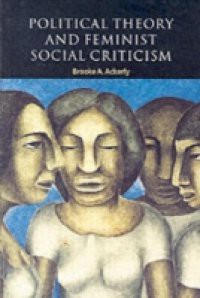In Political Theory and Feminist Social Criticism, first published in 2000, Brooke Ackerly demonstrates the shortcomings of contemporary deliberative democratic theory, relativism and essentialism for guiding the practice of social criticism in the real, imperfect world. Drawing theoretical implications from the activism of Third World feminists who help bring to public audiences the voices of women silenced by coercion, Brooke Ackerly provides a practicable model of social criticism. She argues that feminist critics have managed to achieve in practice what other theorists do only incompletely in theory. Complemented by Third World feminist social criticism, deliberative democratic theory becomes critical theory - actionable, coherent, and self-reflective. While a complement to democratic theory, Third World feminist social criticism also addresses the problem in feminist theory associated with attempts to deal with identity politics. Third World feminist social criticism thus takes feminist theory beyond the critical impasse of the tension between anti-relativist and anti-essentialist feminist theory.

